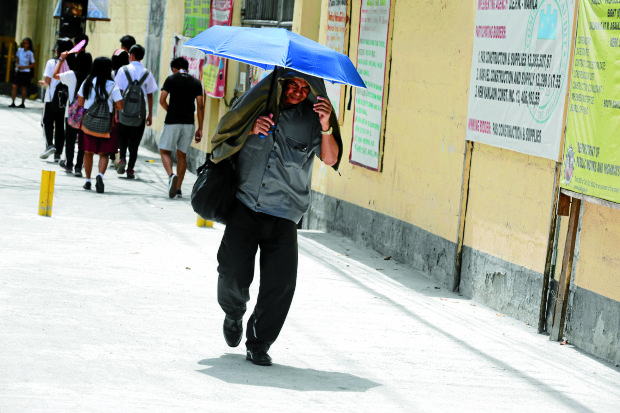
A pedestrian uses an umbrella to fend off the heat caused by raising temperature due to the warm weather in this file photo taken on March 29, 2017. The weather bureau said the heat index has been in extreme levels for the past few weeks. INQUIRER FILE PHOTO / GRIG C. MONTEGRANDE
MANILA, Philippines — Twenty-five areas in the country experienced a heat index under the “danger” category on Friday, the Philippine Atmospheric, Geophysical, and Astronomical Services Administration (Pagasa) said.
Based on the state weather bureau’s computed heat index as of 5 p.m. on May 3, the following areas recorded a heat index ranging from 42 to 47 degrees Celsius:
47 degrees Celsius
- Dagupan City, Pangasinan
46 degrees Celsius
- Aparri, Cagayan
45 degrees Celsius
- Laoag, Ilocos Norte
- Cuyo, Palawan
44 degrees Celsius
- Bacnotan, La Union
- Virac (Synop), Catanduanes
- CBSUA in Pili, Camarines Sur
- Butuan City, Agusan del Norte
43 degrees Celsius
- Iba, Zambales
- Puerto Princesa City, Palawan
- Aborlan, Palawan
- Dumangas, Iloilo
- Catarman, Northern Samar
42 degrees Celsius
- MMSU in Batac, Ilocos Norte
- Tuguegarao City, Cagayan
- Casiguran, Aurora
- Cubi Point in Subic Bay, Olongapo City
- Ambulong in Tanauan, Batangas
- Infanta, Quezon
- San Jose, Occidental Mindoro
- Masbate City, Masbate
- La Granja, La Carlota, Negros Occidental
- Borongan, Eastern Samar
- Guiuan, Eastern Samar
- Cotabato City, Maguindanao
READ: Record-high heat in NCR a ‘glaring symptom’ of global crisis — Legarda
Pagasa defines heat index as “a measure of the contribution that high humidity makes with abnormally high temperatures in reducing the body’s ability to cool itself.”
Heat indices ranging from 42 to 51 degrees Celsius fall under the “danger” category.
People exposed to these heat indices are prone to heat cramps, exhaustion, and even heat stroke with drawn-out exposure.
To prevent the effects of roasting weather, Pagasa said the public must limit time spent outdoors; drink plenty of water; avoid tea, coffee, soda, and liquor; use umbrellas, wear hats, and wear sleeved clothing outdoors; and schedule heavy-duty activities on the cooler periods of the day.
READ: PH may experience similar warm dry months next year, says Pagasa
Pagasa noted that symptoms of heat-related illnesses include heavy sweating, exhaustion or fatigue, dizziness or lightheadedness, blacking out or feeling dizzy when standing, a weak but fast pulse, nausea, and vomiting.
In cases of emergency, Pagasa advised the public to do the following:
- Move the person to a shady spot and lie him or her down with legs elevated
- If conscious, have them sip cool water
- Remove clothing, apply cool water to the skin and provide ventilation
- Apply ice packs to the armpits, wrists, ankles, and groin
- Bring to a hospital immediately